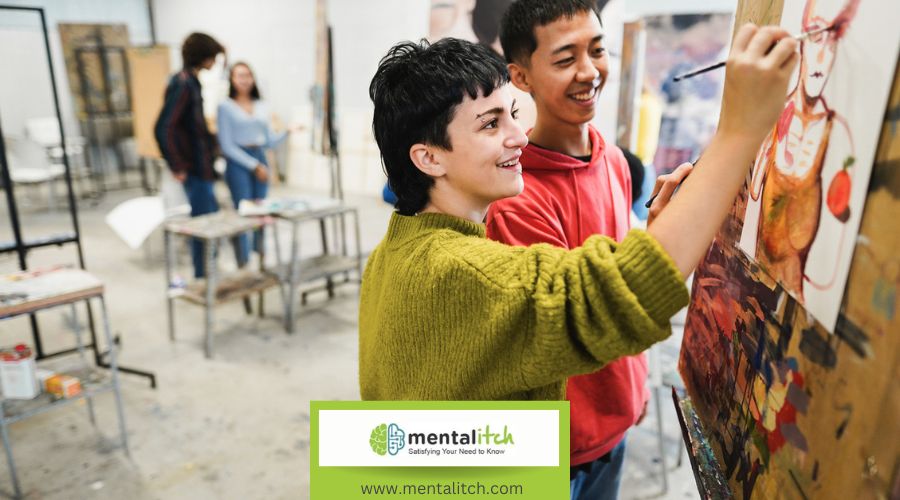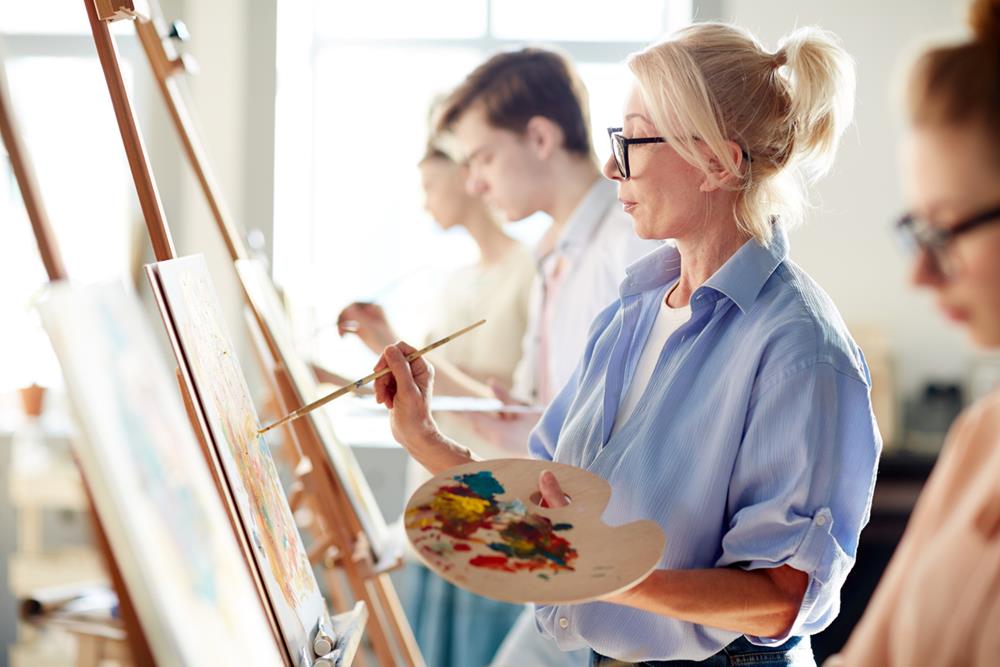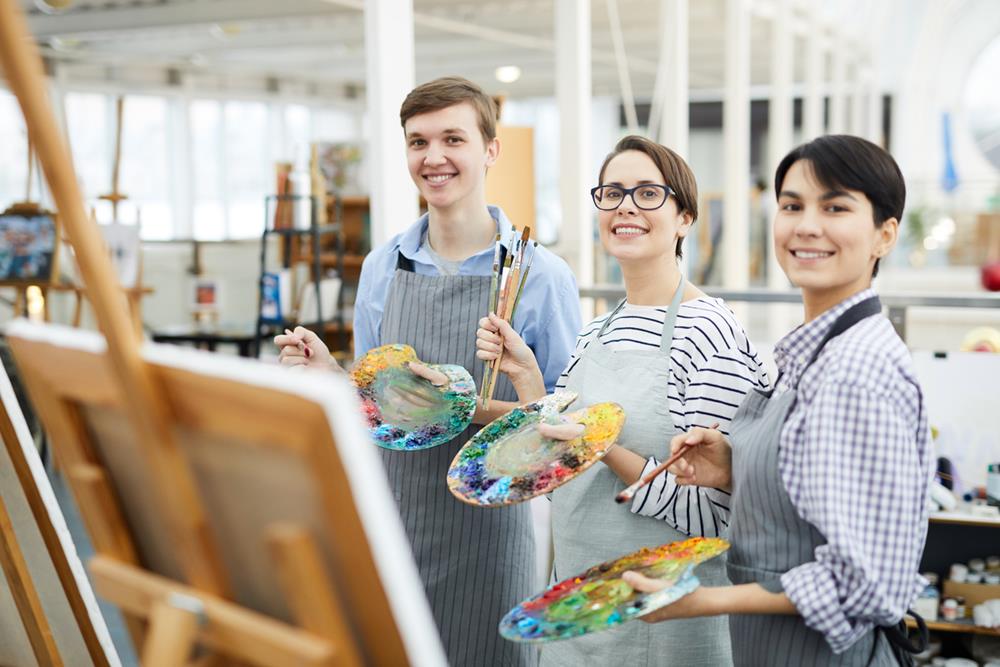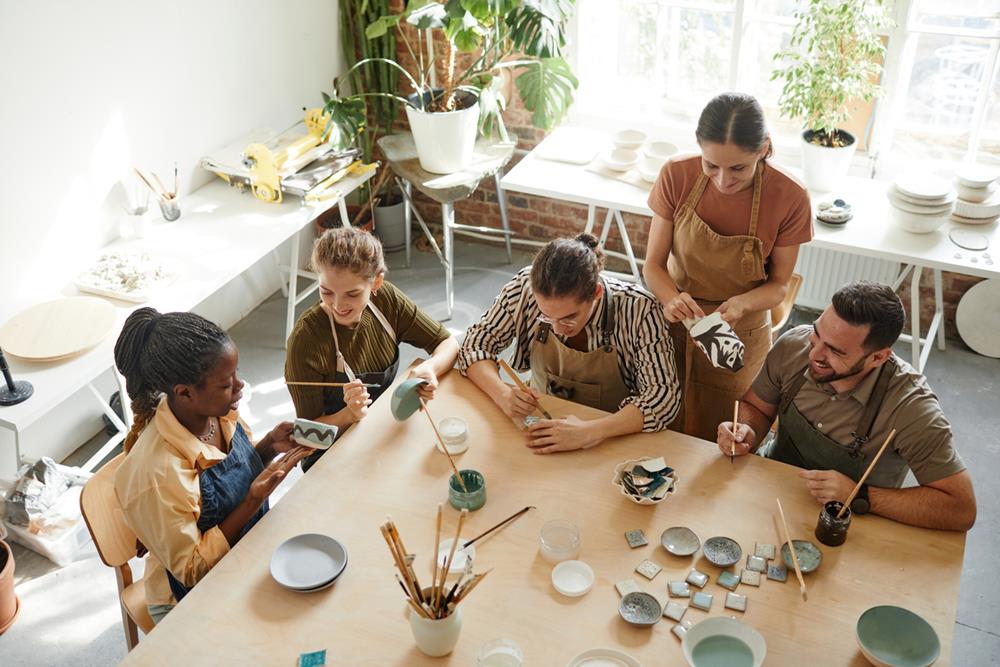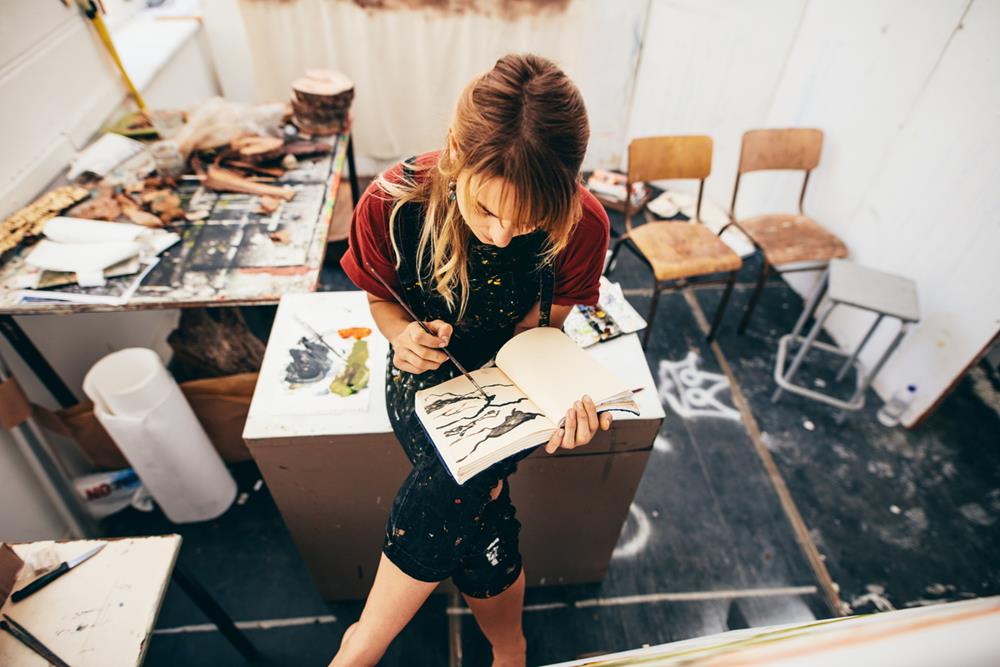Art workshops are special classes where people come together to learn about making art. They’re becoming more and more popular these days. In an art workshop, you can learn how to draw, paint, sculpt, and much more. You might work with pencils, paint, clay, or even computers to create digital art. Some workshops focus on teaching the basics, while others might help you get better at a specific type of art you’re already interested in.
Going to an art workshop is not just about learning new skills. It’s also a chance to meet other people who love art just like you. You can share ideas, get inspired, and maybe even make new friends. Plus, you’ll have a teacher who knows a lot about art to help guide you and answer your questions.
In this article, we’re going to talk about what kinds of workshops you can find, why they’re a good idea to attend, and other great things you can get from them. Whether you’re new to art or have been creating for years, there’s always something new to discover at an art workshop.
Types of Workshops
When you start looking into art workshops, you’ll find there are many different types you can join. Each type has its own focus and benefits. Here’s a closer look at some of the types of workshops available:
Basic Techniques Workshops
These workshops are perfect if you’re just starting out or want to brush up on your fundamental skills. They cover the basics of drawing, painting, and sculpting. You’ll learn about shapes, shadows, colors, and how to use different tools. It’s a great foundation for any artist.
Specialized Mediums Workshops
If you have a particular interest in a certain medium, like watercolor, acrylics, or digital art, these workshops dive deep into those areas. You’ll explore the unique properties and techniques of your chosen medium. These workshops can take your skills to the next level and help you master your favorite form of art.
Thematic Workshops
Thematic workshops focus on specific subjects or styles, such as landscape painting, portrait art, abstract art, or even fantasy art. These sessions are great for artists who want to specialize in a certain theme or are looking for inspiration in a particular area.
Skill Level Specific Workshops
No matter your skill level—beginner, intermediate, or advanced—there are workshops tailored to meet you where you’re at. Beginner workshops are designed to be welcoming and supportive, helping you get started. Intermediate workshops challenge you to refine your skills, while advanced workshops offer high-level critiques and techniques to help you push your boundaries.
Cultural and Historical Art Forms Workshops
These workshops give you a chance to explore art forms from different cultures and historical periods. You might learn about traditional Japanese ink painting, Italian fresco techniques, or Indigenous art forms. These workshops can be incredibly enriching, offering a new perspective on art and history.
By understanding the types of workshops available, you can choose one that best fits your interests and goals. Each type offers its own set of benefits, whether you’re looking to learn the basics, dive deep into a specific medium, or explore new themes and cultures. No matter what you choose, you’re sure to grow as an artist and have a great time doing it.
Importance of Attending an Art Workshop
Attending an art workshop can be a transformative experience for anyone interested in exploring their creative side. These workshops offer more than just a chance to learn new techniques; they play a crucial role in an artist’s development and growth. Here’s why attending an art workshop is so important:
- Skill Development: One of the primary benefits of attending an art workshop is the opportunity to develop and refine your skills. Whether you’re a beginner looking to grasp the basics or an experienced artist aiming to enhance your technique, workshops provide the structured learning environment you need. With hands-on practice and guidance from skilled instructors, you can improve at a faster pace than you might on your own.
- Creative Inspiration: Art workshops are a hotbed of creativity, bringing together individuals from various backgrounds and skill levels. This melting pot of ideas and perspectives can spark new inspiration, helping you break out of creative ruts. Seeing how other artists approach their work and solve problems can open your mind to new possibilities and ways of thinking about your own art.
- Artistic Confidence: For many artists, especially those just starting out, confidence can be a significant barrier to creativity. Workshops offer a supportive and encouraging environment where you can experiment and take risks without fear of judgment. Receiving positive feedback and constructive criticism from instructors and peers can boost your confidence, making it easier to share your work with the world.
- Professional Guidance: Learning from experienced artists and instructors is invaluable. These professionals can offer insights into the art world that you might not discover on your own. They can provide tips on everything from technique and style to navigating the challenges of making a career in art. Their guidance can be a powerful catalyst for your artistic journey.
- Networking Opportunities: Art workshops also serve as a networking platform, connecting you with other artists, potential mentors, and even galleries or collectors. These connections can lead to collaborative projects, exhibitions, and other opportunities to advance your career in art. Networking with fellow artists can also create a sense of community, offering emotional support and camaraderie.
- Exposure to New Techniques and Trends: The art world is always evolving, with new techniques and trends emerging regularly. Workshops can introduce you to these developments, keeping your work fresh and relevant. Learning about new materials, tools, and methods can invigorate your practice and inspire you to experiment.
Attending an art workshop can significantly impact your artistic development, offering a range of benefits that extend well beyond simply learning how to paint or draw better. From skill development and creative inspiration to networking and professional guidance, the advantages of participating in a workshop make it a worthwhile investment for any artist.
Other Advantages of Attending Art Workshops
Beyond the core benefits of skill enhancement, inspiration, and professional growth, attending art workshops offers a spectrum of additional advantages that enrich the artist’s journey in unique ways:
- Access to Resources and Materials: Art workshops often provide access to a wide variety of materials and tools that might be expensive or difficult for individual artists to acquire on their own. This access allows you to experiment with new mediums and techniques without the upfront investment, broadening your artistic repertoire and enabling you to discover new passions within the art world.
- Constructive Criticism and Feedback: One of the invaluable aspects of attending workshops is the opportunity to receive constructive criticism and feedback on your work from both instructors and peers. This feedback is crucial for growth, as it provides insights into areas of improvement and new perspectives on your art. Constructive criticism in a supportive environment encourages learning and development, helping you to refine your skills and artistic voice.
- Personal Growth and Exploration: Art workshops are not just about improving as an artist; they’re also about personal growth. They provide a safe space to explore different aspects of your creativity, challenge your limits, and step out of your comfort zone. This exploration can lead to significant personal discoveries, helping you understand your motivations, inspirations, and goals as an artist and individual.
- Networking Opportunities: Expanding on the importance of networking, art workshops facilitate connections that can be both professionally beneficial and personally enriching. These relationships can support your artistic career in numerous ways, from collaborations and commissions to friendships that offer encouragement and understanding of the artistic journey.
- Exposure to New Techniques and Trends: Workshops can serve as a gateway to learning about the latest trends in the art world and innovative techniques that might not be widely known. Staying abreast of these developments can keep your work relevant and exciting, both to you and to your audience.
- Showcasing Your Work: Many workshops culminate in an exhibition or sharing session, offering a platform to showcase your work. This exposure can be an excellent opportunity to receive public feedback, build your confidence in presenting your art, and even sell your work. For many artists, this is a valuable step towards establishing a professional presence in the art community.
- A Source of Motivation and Discipline: Participating in a workshop requires commitment and discipline, helping to instill a routine that can benefit your artistic practice. The structured environment and the presence of deadlines encourage a focused approach to creating art, which can significantly improve productivity and motivation.
The benefits of attending art workshops extend far beyond simple skill acquisition. They offer a comprehensive growth experience that touches on personal development, professional networking, and the exploration of new artistic horizons.
Preparing for an Art Workshop
Preparing for an art workshop is an exciting step towards enriching your artistic journey. Proper preparation ensures that you get the most out of the experience, enabling you to focus on learning and creating. Here are some tips on how to prepare for an art workshop:
- Research the Workshop and Instructor: Before the workshop begins, spend some time researching the workshop details and the instructor’s background. Understanding the focus of the workshop, the techniques you’ll learn, and the instructor’s teaching style can help you align your expectations and goals. This knowledge can also spark questions you might want to ask during the session.
- Set Personal Goals: Consider what you want to achieve by attending the workshop. Setting personal goals can guide your learning process and help you stay focused. Whether it’s mastering a specific technique, overcoming a creative block, or simply gaining inspiration, having clear objectives can enhance your workshop experience.
- Gather Materials and Supplies: Workshops often provide a list of required or recommended materials and supplies. Make sure to gather these items in advance. If you’re missing something, reach out to the instructor or organizers—sometimes, materials are provided, or you might be able to share with peers. Having the right tools at hand will ensure you can fully participate in all the activities.
- Prepare Your Portfolio: If the workshop includes portfolio reviews or one-on-one sessions with the instructor, prepare a selection of your current work. Choose pieces that represent your skills and challenges. Be open to feedback; this is a valuable opportunity to gain insights from a professional perspective.
- Practice Open-mindedness: Approach the workshop with an open mind and a willingness to experiment. Be ready to try new techniques, even if they’re outside your comfort zone. Art workshops are a safe space to explore and make mistakes—these experiences are often where the most significant learning happens.
- Plan for Note-taking: Bring a notebook or sketchbook for note-taking. Jotting down tips, ideas, and observations can be incredibly helpful, not just during the workshop but also as a reference afterward. You might also want to sketch or jot down thoughts during demonstrations or discussions.
- Engage with Other Participants: Be prepared to engage with fellow attendees. Art workshops offer a unique opportunity to meet like-minded individuals, share experiences, and learn from each other. Networking with other artists can lead to future collaborations, friendships, and a sense of community.
- Mind Your Physical Comfort: Workshops can sometimes be intensive, so consider your physical comfort. Wear comfortable clothing suitable for the activities planned, and if the workshop is long, bring water and snacks. Some workshops might involve outdoor sessions or standing for extended periods, so plan accordingly.
- Be Ready for Feedback: Prepare yourself to receive constructive criticism. Feedback is a cornerstone of the learning process in art workshops. Listening openly to critiques of your work, asking questions, and observing how others receive feedback can significantly enhance your growth as an artist.
By following these preparation tips, you can ensure that you’re ready to make the most of your art workshop experience. Preparation not only sets you up for success but also helps reduce any anxiety or uncertainty, allowing you to fully immerse yourself in the creative learning process.
Conclusion
Attending an art workshop can be a wonderful adventure for any artist, whether you’re just starting out or have been creating art for years. Workshops offer a special chance to learn new skills, meet other artists, and get inspired. By preparing yourself, setting goals, and going in with an open mind, you can make the most of this experience. Remember, every workshop is a step forward in your artistic journey. So, grab your art supplies, embrace the opportunity to grow, and enjoy every moment of your art workshop adventure.
Additional Ideas
- While workshops are usually for advanced or intermediate artists, there are also plenty of art workshops for schools. You should select a workshop depending on your skill level.
- When you attend an art workshop, you will also get to know the professional opinion on which art supply is the best for different types of artwork. For instance, if you are working on a drawing and you get to choose a marker, you will get professional assistance as to which one is the best for you, i.e., whether you should choose Copic Ciao Markers or Prismacolor Premier Double-Ended Art Markers or others.
- If you want to improve your art skills through art mentorship or workshops, visit https://www.wingedcanvas.com/school-programs.
